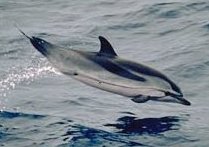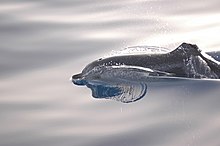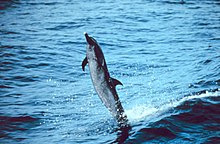Spotted dolphins
| Spotted dolphins | ||||||||||||
|---|---|---|---|---|---|---|---|---|---|---|---|---|

Blue and white dolphin |
||||||||||||
| Systematics | ||||||||||||
|
||||||||||||
| Scientific name | ||||||||||||
| Stenella | ||||||||||||
| Gray , 1866 |

The spotted dolphins ( Stenella ) are a species of dolphins that is widespread in warm seas around the world .
features
The spotted dolphins are small to medium-sized, slender animals with a length of 1.5 to 3.5 meters, with the males usually being slightly larger. The muzzle is long and narrow and set off from the head by a furrow. The body coloration is very variable within the genus and also within the species, with mostly dark-gray upper and white-gray underside to which, depending on the species, different stripes or spots appear. There are 28 to 65 small, pointed teeth on each side of the jaw. The number of vertebrae is 68 to 81.
Way of life
Spotted dolphins are deep sea animals that colonize clear, deep, coastal areas. In some cases, larger forms residing in the area of the continental shelf and smaller forms preferring the open ocean have been described within the species . They are mostly found in small groups and only very rarely individually, but schools with several thousand animals have also been observed in the slender dolphin . Like other dolphins, they communicate with each other by whistling and clicking sounds. Spotted dolphins are very happy to jump and repeatedly show the habit of jumping vertically out of the water and turning around their longitudinal axis, only to then submerge their tail first. The food is almost exclusively small fish, and sometimes squid as well.
Systematics
The systematics of the genus was controversial for a long time and a total of over a dozen different species have been described . Today five species are recognized:
- East Pacific Dolphin ( Stenella longirostris )
- Clymene Dolphin ( Stenella clymene )
- Blue and white dolphin ( Stenella coeruleoalba )
- Common dolphin ( Stenella attenuata )
- Chinstrap Dolphin ( Stenella frontalis )
Threat and protection
Partly fished directly, the species of the genus are particularly threatened as bycatch when fishing for tuna , as they often migrate with schools of tuna. All species are listed in Appendix II of the Washington Convention on the Protection of Species .
literature
- Ronald M. Nowak: Walker's Marine Mammals of the World . JHU Press, 2003, ISBN 978-0-8018-7343-0 , pp. 157-160 .
- Spencer Wilkie Tinker: Whales of the World . Brill Archive, 1988, ISBN 978-0-935848-47-2 , pp. 136-137 .
